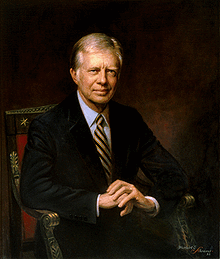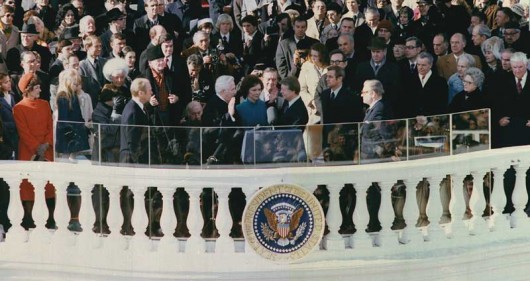Intersections

(Official Portrait of James Earl Carter as President of the United States. Government photo.)
Now, as you know, I started jotting down Admiral Mac’s stories on the paper napkins at Willow years ago. Talking with him was a way to time-travel to the years of great danger to the Republic, both economic and in armed conflict.
Talking to him about the years of the Great Depression in his native Iowa was novel, at least until we entered into our own version of economic bust, and is a useful companion to put our current pain in context. Then, the stories of going to war, and being present right through the course of the whole dramatic narrative of the savage war in the Pacific, are riveting.
At least they are in the hearing- if I don’t get across how astonishing it is to have Mac as a pal, the fault is entirely mine.
I am reading a fabulous account of the early action in Iron Bottom sound off Guadalcanal on my Kindle and iPad by the pool. It is called “Neptune’s Inferno” by James D. Hornfischer, and it contains matter-of-fact descriptions of the horror of violent death in the machine age that make a Cold War-era sailor blanche.
Being stuck in a steel box as your ship is pulverized is beyond the worst nightmares that come when you think of all that water under the keel, and the potential fire above. It was hyper-real in a way that boggles the mind.
Mac’s post-war career, and his rise to flag rank in the Cold War and against the backdrop of the war in Indochina neatly spans the decades to the days when I wandered into a recruiting office in Grand Rapids, Michigan, and decided I wanted to go to the show myself and see what the elephant looked like for myself.
That was late in 1976, when Eddie Boland was sizing the job of bringing the Intelligence Community to heel with his Select Committee on Intelligence that he stood up the next year when I went on active duty.
It was an intersection, of sorts, since my younger son called me up in the crushing heat of the late afternoon to inform me he had been formally indoctrinated into the mysteries of the Family Business, and would be willing to talk to me if I could demonstrate current access and a need-to-know.
That wasn’t the only collision of past and present. My attorney pal called me up to comment on Congressman Eddie Boland. I mentioned that Jim Bush used to regale us with stories of the colorful legislator. Eddie was a piece of work. He went to Washington with the man who would become speaker of the House, Thomas P. “Tip” O’Neill, in 1952. Eddie was a bachelor for the twenty years they roomed together in what they called a real-life “Odd Couple,” with Boland being the Jack Lemmon to Tip’s Walter Matthau.
I often wonder what Eddie thought about the matter of John Kennedy’s murder. In 1963, he had accompanied the President on a trip to Ireland just a couple months before the Deranged Lone Gunman story was invoked to account for a dramatic change in government. That might have accounted for Eddie’s interest in dismantling the operational arm of the Agency, I don’t know. I know that Mac has his suspicions on what went on in Dallas, and the aftermath, and maybe it is best to just leave it alone.
In 1965, Eddie Boland marched with Dr. King Jr. at Selma, AL, and of course Martin was shot down as well by a red-neck assassin who was picked up in London after the shooting at the Lorraine Hotel in Memphis.
Certainly the King family has always had their doubts about motive and opportunity, and the assassination of Bobbie Kennedy made a trilogy of political murder that certainly has its queer symmetry.
Anyway, the Attorney called me up on the cell. “Funny you should mention Eddie Boland,” he said. “You refreshed my memory of him being the fourth guy who rode in my old Rambler when I took Tip O’Neill, Jim Delaney, and Eddie to Mass in Washington in 1966 on the Feast of the Assumption.”
“Intersections,” I said. “Mac’s story blends right into ours.” The thought stayed with me after the Attorney clicked off to go to court in sun-kissed San Diego. Besides Mac and Jim Bush, there were all sorts of old pals who had ring-side seats to what was going on in Washington.
A shipmate named Bill is retired up near the old naval station at Cape Henlopen in Delaware. He dropped me a note to remind me that during the days of the Pike and Church Committees, Admiral Rex had left his post as the Director of Naval Intelligence and been appointed (with a third star) to be Deputy Assistant Secretary for Intelligence, and Bill had been his Exec in the Pentagon.
Mac was on the IC Staff then, trying to implement the directives contained in the Schlesinger Report about the out-of-control intelligence community. Jim Bush was still on active duty as a blue-suit Colonel. Jim had left the operational side of the Air Force and developed a specialty in the intelligence budget, which was the site of desperate skirmishing against the dramatic cuts in authority that came with the end of the Vietnam War.
Jim was working for a budgetary legend named Jim Vance, who bill recalls as being the “the biggest budget magician of all time. Vance knew where the skeletons were buried and who had buried them.”
They got Vance, though he went with his life intact. Things became much more gracious in Washington after the ‘60s. He made the mistake of taking on Fort Meade. NSA was in the middle of a desperate downsizing effort when, in 1973, it was hit with a round of-budget cuts which became known as the “Clements cuts.” The real author of the directive was Vance, who worked for Dr. Albert Hall in the budget shop of what we know now as USD-I.
Through his Boss, Vance contended that cryptology was overfed and under worked, and he embarked on a detailed study of the cryptologic system. The upshot was a recommendation that NSA absorb an additional three percent salami-slice in resources.
Clements imposed a total CCP billet reduction of 12,999 to be completed by fiscal year 1978.7 (Since the cryptologic budget already showed a large reduction during that period, the real additional manpower cut was “only” around five thousand jobs.
Vance specifically called out the problem with NSA- “a bloated management system with overlapping authorities” and the potential of new technology to increase efficiencies.
Stop me if any of this seems familiar.
I was in Grand Rapids the night before the election in 1976, when Jimmy Carter was elected to his disastrous experiment with being a moral President.
President Ford was making his last public appearance before voting the next morning, and I had got fried at the bar in the basement of the Pantlind Hotel before emerging from the basement staircase to find myself pressed by the crowd from outside into a position right before the Presidential Podium in the lobby.
I think I said something eloquent when the unelected President from Grand Rapids finished his brief remarks to a wildly supportive home-town throng: “We love ya, Jerry!” I thought about that with the news of Betty Ford’s funeral
Then, with Jimmy as Commander-in-Chief, and a profound malaise abroad in the land, I went to Asia.
When my pal Bill retired and recycled his uniform for a suit, he reported as the civilian Exec Assistant to Admiral Dan Murphy Sr. Jim Bush was gone, working for Eddie Boland on the Hill, but Vance was still there, working his budget magic.
The Agency got him, though, pushing him out under a cloud along with the NRO’s legendary Jimmy Hill.
I met Hill once out at Westfields at a conference about the next round of budget cuts, and was pretty amazed to encounter the guy who engineered Spooks in Space. My pal Bill intimated it was Jim Bush who had orchestrated the departure of Vance and Hall in alliance with Fort Meade as pay-back for the budget cuts.
Funny how it is the budget people who wind up making policy. Watch what is happening on the Hill right now. It is amazing.
but soon to go under a cloud along with Jimmy Hill at NRO. I always assumed that it was Jim Bush who orchestrated their departures.
But of course, Mac was struggling to set up the framework of preserving American liberty while maintaining an intelligence capability compatible with the Constitution and the wild-eyed idealism of that Georgia peanut farmer.
But to talk about those days, we have to talk for a minute about Stansfield Turner, the Twelfth Director of CIA, and the man who was sent to clean up Langley once and for all.
He might be the most hated man who ever served there. I was sitting in the rotunda of the National War College a few years ago when I realized who I was sitting behind. It was the Admiral, all right, the guy who single-handedly purged the Directorate for Operations. My pal Charlie was there for that, a naval officer seconded to the Agency as a guy Turner could trust, since there wasn’t anyone else he could.
It may be a tribute to Mac and the Community Management Staff that Admiral Turner lived through it.
But more on that tomorrow. I gotta tend to the day job, and thereare several intersections between me and the desk at the office.

(Jimmy Carter is inaugurated. US Government Photo.)
Copyright 2011 Vic Socotra
www.vicsocotra.com
